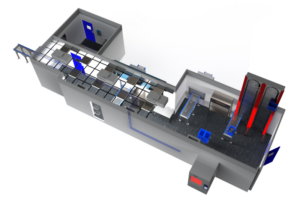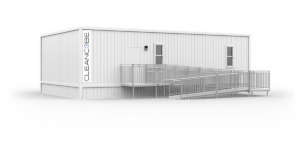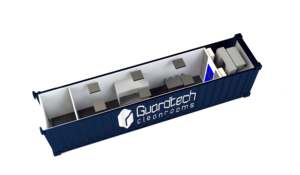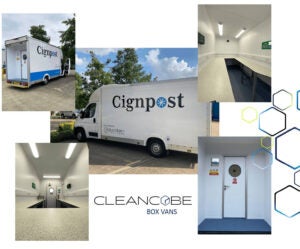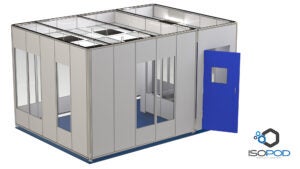Filter Integrity: Passing the Test with Guardtech

WHEN IT comes to managing risk in a controlled environment, there aren’t many factors quite as critical as a fully functional filtration system. It’s particularly crucial for firms in industries such as Healthcare, Life Sciences and Pharmaceuticals, where filter failure can lead to not just unwanted particulate but dangerous microbial ingress.
If unfiltered bacteria particles are allowed to pass into a cleanroom and grow, this can not only compromise product, it could endanger staff. This is just one pertinent reason why any laboratory, cleanroom or controlled environment must have a robust filtration system – one which is tested regularly to ensure its efficacy.
Step forward, Guardtech Cleanrooms – whose Filter Integrity Tests are specially designed to ensure that the highest possible standards are met.
According to ISO 14644-3, at no point should your filters have more than 0.01% particulate penetration. Guardtech identify any compromised filters, work with clients to determine the cause of the issue and then, if a replacement is needed, install the correct filter with the same care and attention to detail that they put into their world-class turnkey cleanroom construction builds.
Guardtech’s Operations Director Conor Barwise has carried out many Filter Integrity Tests over the years – and is confident his company should be the go-to firm for any business looking to get their filtration system up to scratch. “We’ve really honed the way we do things now,” he said, “to deliver an efficient, reliable and professional service which delivers excellent results in good time, with no let-up in quality.
“It’s easy to take for granted just how vital a highly competent filtration system is – the smallest reduction in a filter’s integrity can have grave consequences for a controlled environment. I’d urge any businesses with cleanrooms or labs who haven’t got a regular Service Contract in place to get in touch with us. As well as our Filter integrity Tests, Guardtech run a thorough programme including full validation, decontamination and plant maintenance.
“If you’re at all concerned that what you do could become compromised by an inefficient system, or if you just want peace of mind, let Guardtech take away the hassle of managing your cleanroom.”
Guardtech usually tend to deploy a two-person team to carry out their Filter Integrity Testing – with an oil-based smoke applied downstream towards the filter. The engineers then measure the challenge of the smoke – ensuring that the amount of smoke applied, and its velocity, is within the parameters set by the standards, while maintaining a constant flow.
A photometer is used to scan the filter face to check for any compromised areas, with a concerted focus on the areas most likely to fail, such as around the edges. Filter differential pressures and airflow volume readings are also taken with a manometer and anemometer at particular zones to further support the readings.
The entire filter is scanned within a specified time period to ensure there are no discernible leaks. To provide an extra level of reassurance to clients, Guardtech supply printed raw data from the testing – rather than just relying solely on the handwritten word of the engineer.
Given the wide breadth of controlled environment facilities that Guardtech have built over the past 20 years, as well as those they currently service, they’ve subsequently employed a variety of testing methods dependent on the site. But whether it’s a site with a series of bespoke Air Handling Unit or a ceiling grid with hundreds of Fan Filter Units, Guardtech are happy to work with clients to determine the most effective test ports and challenge methods to deliver full compliance to standards.
Guardtech Service Engineer Chris McGinn guarantees a meticulous, swift and professional approach from his team. “We take the greatest care possible to ensure the best possible results for out clients,” he said. “Whether it’s the seals of the filter, the housing or the joints onto the ductwork, we make sure that there are no areas where contamination could potentially build up.
“If you have a cleanroom but you don’t have a regular service agreement in place, please get in touch – we’d be delighted to support your business.”


